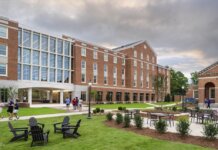
When Deon Gordon talks about his college years, it’s not to boast about perfect grades or rigorous classes. Quite the opposite.
“I was a terrible student,” he says, laughing. “Instead of going to architecture class, I’d head to the library and teach myself how to code.”
That pivot — away from the classroom and into a world of self-taught tech — would change not only Gordon’s life, but also the landscape of Birmingham’s innovation economy.
Today, as president and CEO of TechBirmingham, Gordon is at the helm of the city’s tech ecosystem, guiding its growth with a vision rooted in community, equity and storytelling.
A Path Less Traveled
Born and raised in Birmingham, Gordon graduated from Ramsay High School before attending Auburn University. There, he enrolled in the architecture program but quickly discovered a different passion.
“I didn’t even know computer science was a discipline when I got to college,” he says. “No one told me this could be a career.”
Instead, he learned by doing, experimenting with online ventures. “I wasn’t creating the next Facebook or anything like that,” Gordon says. “But I started some small businesses, and once money started coming in, as a college kid, I’m like, ‘Oh, well, this is the path.’”
Gordon was eventually earning enough to catch the attention of Birmingham entrepreneur John Garrett. Garrett invited Gordon to work at his firm, which would become Chronicle Studio, a full-service digital agency.
That experience gave Gordon a crash course in entrepreneurship and operations, working with clients like the University of Alabama at Birmingham and Royal Cup Coffee.
TechBirmingham: A Unifying Force

A couple of career stops later, Gordon ended up as president and CEO of TechBirmingham.
Founded in 2002 under former Mayor Bernard Kincaid — with great assist from attorney Jim Rotch, Gordon says — TechBirmingham began as a city task force. It has since evolved into an influential trade association for the region’s tech and innovation industries.
Gordon came to TechBirmingham at the end of 2017, and at the beginning of 2020, TechBirmingham, along with Apple, TechAlabama, the Alabama Power Foundation and Birmingham City Schools, launched the tech education initiative Ed Farm. “We incubated it in Birmingham, and they’re just growing like gangbusters,” Gordon says. “It’s one of the best things I feel I’ve ever done in my life. It truly can develop into a national platform, and I’m just so super proud to have been a part of that experience.”
Under Gordon’s leadership, TechBirmingham focuses on five pillars: marketing, advocacy, growth, innovation and community. All are part of what Gordon calls “helping members create magic” — a nod to Birmingham’s historic nickname, The Magic City.
“We’re member-driven,” he says. “But increasingly, we’re supported by corporate partners, philanthropic dollars and our foundation, which helps us run programs like Next In Tech, which provides free access to events for students and early-career professionals.”
The organization also is closely aligned with Innovation Depot, where TechBirmingham is a tenant and Gordon is a board member.
Sloss Tech: A Spotlight on the South
One of TechBirmingham’s most visible successes is Sloss Tech, a multiday innovation conference that started in 2016 as a companion to the now-defunct Sloss Music & Arts Festival, known as Sloss Fest.
Inspired by South by Southwest in Austin, Sloss Tech was designed to showcase Birmingham’s growing tech scene — and that goal hasn’t changed.
This year’s conference, slated for June 25-27 at Birmingham’s Lyric Theatre and other nearby venues, features a first: a pitch competition sponsored by the Regions Foundation, awarding $50,000 to the winner.
“That kind of money is nothing to sneeze at,” says Gordon, adding that the conference also will include speakers (keynoters include Zack Kass, Rashaun Williams, Ruha Benjamin and Johnny Cupcakes), a startup showcase, founders house and some nighttime events.
Gordon is quick to note that Sloss Tech isn’t just for Birmingham — it’s a platform for the entire state.
“About 30% of attendees are coming from over an hour away,” he says, a number that continues to grow.
“It’s very affirming and reassuring and exciting, and so, over the next two years, we’re going to see the rise of Birmingham, but also the entire state and recognizing that we’re all going to be stronger together.”
Tech, Mobility and the Next Wave

As the state moves further into innovation-driven economic development, Gordon sees mobility as a major opportunity.
“Think of Alabama as a diamond,” he says. “You’ve got Mercedes to the west, Honda to the east, Toyota and Mazda to the north, Hyundai to the south — and Birmingham is right in the middle.”
That centrality is why TechBirmingham is launching a new mobility accelerator. The program will attract startups focused on electric vehicles, drone delivery, autonomous logistics and more.
And the beauty of Alabama’s ecosystem, Gordon notes, is that each region plays to its own strength: aerospace and defense in Huntsville, maritime logistics in Mobile, inland port infrastructure in Montgomery.
“We all have our own unique lanes and industries that allow us to play to our strengths without necessarily competing with one another,” he says.
Changing the Narrative
Gordon believes that Birmingham’s story — both its past and future — needs to be told more fully and more accurately.
“What happened here led to the Civil Rights Act of 1964, and what happened in Montgomery and Selma led to the Voting Rights Act of 1965, and those were things that started to shake the conscience of the nation and move it in a better direction,” he says. “It inspired the world, but most people are more familiar with the tragedy, not the triumph. We’ve got to change that.”
He argues that a city’s reputation impacts its ability to attract tech talent. “If graduates don’t see Birmingham as aligning with their values, we lose them before we even have a shot.”
That’s why TechBirmingham invests heavily in brand awareness and storytelling. “Birmingham is a city that’s gritty in all the right ways,” Gordon says. “It’s scrappy. It’s a city where you don’t have to wait in line to make an impact, if you want to roll up your sleeves and fight for the underdog.”
From the food scene to the people, from affordability to grit, Gordon sees Birmingham as a hidden gem. “We just have to tell that story,” he says. “We have to be incredibly vocal and aggressive and consistent about it.”
Building for What’s Next
Looking ahead, Gordon wants to see continued growth: more TechBirmingham members, more startups and more statewide collaboration. The mobility accelerator is just one initiative that will position the state as a national leader in innovation.
And Sloss Tech, he hopes, will become a fixture on national calendars. “One of the ultimate goals is to make sure that Sloss Tech is so well known that people nationally are circling the dates of it,” he says. “People are already getting hired because of who they meet there.”
For Gordon, it all comes back to building the kind of ecosystem he didn’t have growing up.
“I’m grateful for my convoluted, crazy path,” he says. “It’s obviously given me a certain perspective and appreciation. But my goal now is to make sure that there are pathways and avenues that provide clear on-ramps into these industries.”
Alec Harvey is executive editor of Business Alabama, working from the Birmingham office. Joe De Sciose is a Birmingham-based freelance contributor.
This article appears in the June 2025 issue of Business Alabama.



